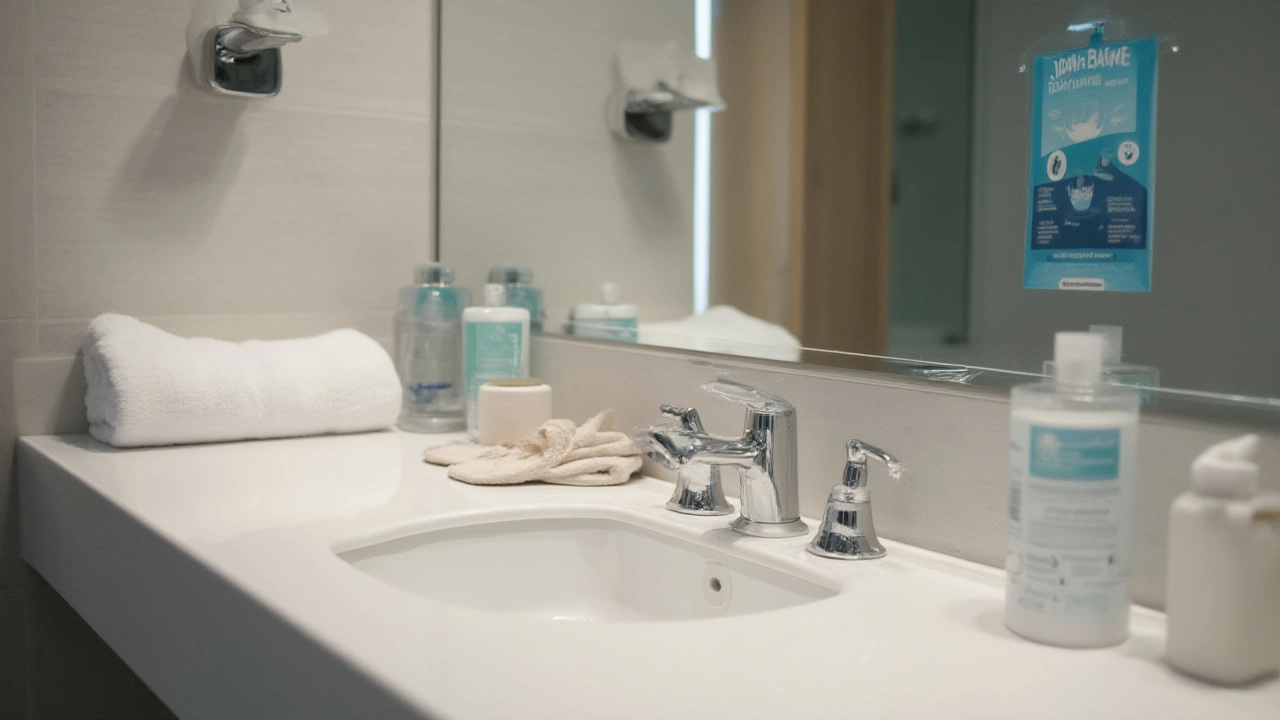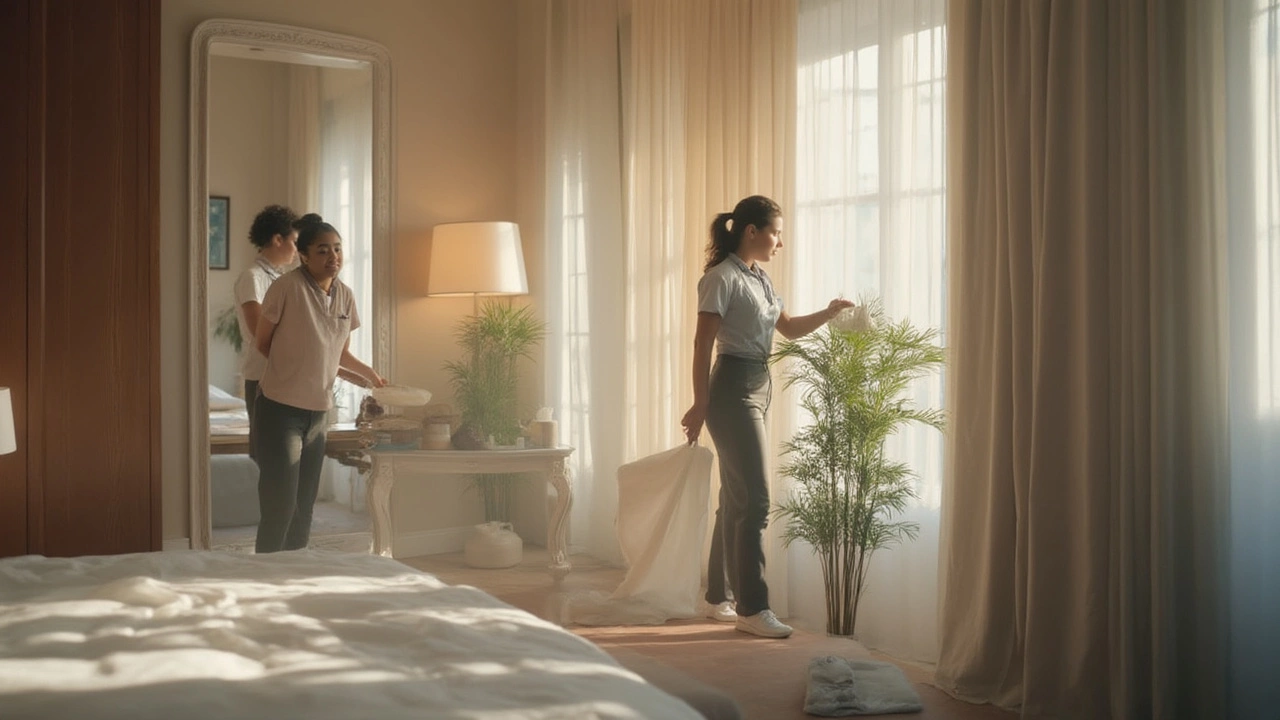Imagine walking into a hotel room, the faint aroma of disinfectant lingering in the air, and you suddenly wonder—just how clean is this place? Now, picture that place is a love hotel, known for privacy and short stays. Are love hotels sanitary, or should we be clutching a can of disinfectant spray in both hands? The question is as real as it is embarrassing for some people to ask, but don't worry—I'll spill the beans. Even my cat Muffin would be curious about corners people forget to clean. The idea of love hotels immediately conjures up questions about cleanliness, since the rapid guest turnover and secretive vibe tend to fuel wild rumors. But the real answer is more interesting than you might guess. Let’s peek into what actually happens after the doors close and before the next guest arrives.
Love Hotels 101: Why the Hygiene Question Matters
If you’ve never been inside a love hotel, you might think they’re a dodgy invention. Actually, in places like Japan and South Korea, love hotels are part of everyday life. They look discreet on the outside, often with barely any signage, and cater to everyone from young couples seeking weekend adventure to married folks who need a tiny break from nosy roommates. These hotels make turnover efficient; many rooms are cleaned several times a day, as guests usually rent by the hour or in blocks.
The core question always revolves around cleanliness. Let’s face it, when you rent a room for a short tryst, you want to know if it’s really sanitized after the last guest left. High turnover means more cleaning but also leaves more room for corners to get cut—unless the hotel is run like a well-oiled machine. Interesting fact: In Japan alone, there are about 37,000 love hotels and over 500 million visits every year. With this volume, sanitation is serious business because a bad reputation spreads quickly. Unlike typical hotels, love hotels often face tougher scrutiny on hygiene by local agencies because of their unique use. Some larger hotels even compete by advertising their cleaning routines and spotless records.
Still, love hotels are not all built the same. There are swanky, themed places with Jacuzzis and disco balls, and then there are budget spots with “quirky” furnishings and rough-around-the-edges service. A 2023 study by the Japanese Sanitation Association found that luxury love hotels scored just as high on cleanliness as top business hotels. But, like anywhere, not every hotel earns a gold star. The bottom line: asking questions about hygiene isn’t nosy—it’s smart.
So why is hygiene such a hot topic? For starters, love hotels can’t just risk being average. Their reputation lies in privacy and comfort, not grimy sheets or sticky remote controls. The spread of an infectious illness, a bedbug sighting, or even social media outrage from dirty rooms would be catastrophic. This drives many love hotels to use advanced cleaning tech, such as UVC lamps, fogging disinfectants, and the same anti-microbial spray used in hospitals. The famous Japanese “cleaning ninjas”—stealthy, fast, and always thorough—are trained to turn a room from wild mess to sparkling fresh in fifteen minutes. If you think regular hotels take hygiene seriously, love hotels would raise the bar, or at least try to.
To put numbers to the buzz: According to a 2024 customer survey from Tokyo, 67% of guests said their reason for choosing a love hotel included “cleanliness and hygiene guarantees.” That’s a big chunk. Guests care. And with competition, hotels play up the clean factor to keep people coming back.
Behind Closed Doors: What Cleaning Really Means in Love Hotels
You’d expect the cleaning process to be simple. Pull off used sheets, scrub the bathroom, restock the mini-mate, done. But in love hotels, the cleaning team’s routine is intense—think race car pit-stop with a bucket and mop. Speed is essential, but not at the expense of details. After all, the next guests could arrive in twenty minutes.
Sneak behind the scenes in any reputable love hotel, and you’ll see cleaning teams arrive seconds after a guest leaves. Gloves on, fresh linens in a cart, and a checklist longer than your grocery list. First, they deal with all linens and towels—everything gets collected to be laundered at commercial sanitizing temperatures. They don’t just remake beds; they flip the mattress pad, replace the pillow protectors (not only the cases), and switch out duvets—even decorative pillows go into a pile for special washing cycles. Then it’s time for high-touch hot spots. Door handles, TV remotes, light switches, air conditioning units, spa bath buttons—team members hit every item with alcohol wipes or hospital-grade sprays.
Here’s an insider tip: much of the cleaning you don’t see happens with tech. UVC sterilizer wands zap bacteria on upholstery and mattresses (watch out, Muffin would not love this for her cat bed). Electrostatic sprayers, like the ones airlines use, help disinfect large, odd-shaped furniture quickly. Some places even go all-in with fogging machines that mist nooks and hidden spots. In post-pandemic Asia, this became the norm, boosting confidence for guests who might otherwise have second thoughts.
The bathroom—always the big anxiety trigger. In love hotels, not only are toilets scrubbed, but the entire bathroom gets doused with disinfectant spray, even on walls and under sinks. Jet tubs or Jacuzzis undergo a full draining and pipe cleanse (using chemical cleaners to flush the hidden plumbing), not just a swirl of hot water. Hairdryers, plastic cups, amenities? All replaced or freshly sanitized. It’s not unusual to see a time-stamped “last cleaned” tag displayed somewhere in the room, giving guests proof of when the job was finished.
If you want to get nerdy about it, here’s a quick rundown table that compares cleaning procedures between regular hotels and love hotels, based on regional hospitality standards from 2023:
| Cleaning Task | Regular Hotels | Love Hotels |
|---|---|---|
| Bed Linen Change | After each stay | After each stay & every 3 hours |
| Towel Replacement | Daily/sometimes after each guest | After every visit |
| Surface Disinfection | Once daily | After every guest |
| Bathroom Sterilization | Standard cleaning | Deep disinfectant protocols, including fogging |
| High-touch Item Disinfection | Variable | Every item after every use |
| UVC/Germicidal Use | Rarely | Frequently (especially in Asia) |
So, is it perfect? No place is. But major chains and reputable love hotels see clean freaks as their best customers, so cleaning is high-octane.

Secrets, Red Flags, and the Truth About Spotless Rooms
Curiosity killed the cat (sorry Muffin), and it’s okay to be deeply nosy when it comes to your health. Not every place lives up to the hype, so here are a few insider tips for finding a love hotel that doesn’t just look clean but actually is:
- Check online reviews. People notice if something’s off. Guests post honest opinions—look for recent mentions of bad smells, hair, mysterious stains, or unclean bathrooms.
- Look for “last cleaned” signage or time stamps. If there’s none, it might not mean a problem, but transparency is a good sign.
- Spot check essentials when you enter. Pull back the duvet, check the mattress pad, give the shower a quick once-over. If something feels off, ask for another room or leave—staff usually prefer customers mentioning concerns rather than blasting bad reviews online.
- Ask about cleaning protocols at check-in. A reputable place should have no problem telling you how they handle hygiene—or even proudly display their certifications.
- Choose mid-to-high end hotels during off-peak hours if you want more time between guest cleanings. Higher turnover at busy times can mean rushed jobs.
Some horror stories go viral—stuck-on hair, lipstick on glassware, or fingerprints on mirrors. But these are outliers in quality places. The real villains are low-budget, poorly managed hotels hoping no one looks closely. If a room smells odd or feels sticky, trust your instincts, not marketing.
One little-known fact: in Japan, health authorities inspect love hotels more frequently than business hotels. That means their cleaning routines get checked, and mistakes can cost them their license. In South Korea, several large love hotel chains send their cleaning staff to certified hospitality programs, and even publish their inspection scores online. In Brazil, where love or “motel” culture is huge, many places now use disposable bedding. Hotels in Latin America saw a surge in reservations during the pandemic, prompting mass upgrades to thicker cleaning protocols to prevent bad headlines. So, things are generally getting cleaner—not less—over time.
If you want your own peace of mind, bringing a mini sanitizing spray isn’t a bad idea—but in most reputable love hotels, you probably won’t need it. Still, I keep a stash of wipes in my bag for airplane seatbelts, so I get the urge!
How to Stay Safe: Smart Tips For Love Hotel Visits
Ready for first-hand advice from someone who’s toured a fair share of hotels (not Muffin, but she’d surely snoop around the corners and under the bed)? If you’re planning a stay or just tentatively curious, here’s how to make sure your room is truly guest-ready and super clean:
- Bring a personal hygiene kit. Pack antibacterial hand wipes, a small bottle of sanitizer, and your own pillowcase if you’re particular about bedding.
- Look for touchless check-in. Many love hotels now let you check in via machines, reducing your exposure to other people and lessening the risk of germs passing at the desk.
- Ask for a room that’s just been cleaned or that’s farther from the lobby—these often have less traffic and less potential cross-contamination.
- Inspect the controls—TV remote, air-con, and switches. Wipe them down if you’re paranoid (you wouldn’t be alone; a 2023 guest survey found that over 40% of travelers now wipe down hotel surfaces regardless of star level!).
- Pack flip-flops or hotel slippers for moving around the room, especially if you want to avoid damp floors or carpets that see heavy use.
- Check the bathroom. Water stains, hairs, or lingering soap scum are warning signs the cleaning was rushed.
- If you see a staff member in the hallway, don’t be shy—ask about the cleaning cycle. Kind, direct curiosity shows you’re a responsible guest, not a nuisance.
If you have allergies or a sensitive nose, a love hotel’s strong cleaning fluid smell can be reassuring, but you can always ask for a lightly aired room if the scent is overwhelming. Some hotels now use hypoallergenic sprays or pass rooms through air purifiers before guests arrive.
One last personal insight: good love hotels are aware that trust earns loyalty. Their aim is to make the room feel like it wasn’t just cleaned, but completely reset—so you can step inside and forget anyone else was there before. It’s a level of comfort worth demanding wherever you stay.
Bottom line? Not all love hotels are spotless, but the best among them are fierce about hygiene—often more so than traditional hotels. So, go ahead and be picky. Your peace of mind (and possibly that of your partner…and your cat at home) is worth it.
